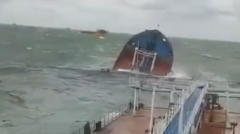The collision of two Russian oil tankers in the Black Sea has resulted in injuries, fatalities, and environmental hazards. A rescue operation was hindered by inclement weather, and a working group has been established to investigate potential negligence.
Catastrophic Oil Tanker Incident in the Black Sea Raises Environmental Concerns

Catastrophic Oil Tanker Incident in the Black Sea Raises Environmental Concerns
Two Russian oil tankers have suffered extensive damage, leading to an oil spill in the Black Sea, prompting a search and rescue operation amid poor weather conditions.
Two Russian oil tankers have been severely damaged in a distressing incident in the Black Sea, resulting in a notable oil spill, as reported by Russian authorities. Recent footage from the Southern Transport Prosecutor's Office displays one of the tankers drastically split in two, with streaks of oil clearly visible in the surrounding waters.
The two vessels are believed to have drifted and subsequently grounded themselves offshore. Preliminary reports suggest that at least one crew member has lost their life in the tragic event. The accident occurred in the Kerch Strait, the strategic waterway that acts as a separator between Russia and the Ukrainian peninsula of Crimea, which has been under illegal annexation since 2014.
Emergency rescue operations were initiated, involving numerous tugboats, helicopters, and more than 50 rescue personnel. Success was achieved in extracting 13 crew members from one of the tankers, although the mission was later called off due to adverse weather conditions. The remaining 14 crew members on the second tanker are said to have adequate provisions for immediate survival, but they may remain stranded until the weather permits rescue efforts to resume.
In response to the alarming incident, President Vladimir Putin has established a working task force led by Deputy Prime Minister Vitaly Savelyev to address the situation, while also initiating a criminal negligence investigation. Shipping industry analyst Michelle Bockmann noted to the BBC that the two vessels involved were owned by Volgatanker and characterized them as relatively small, each transporting approximately 4,300 deadweight tons of oil. To put this in perspective, larger commercial tankers typically carry around 120,000 deadweight tons of oil for international trade.
The Kerch Strait plays a crucial role not only for Russian exports of grain but also for shipments of crude oil, fuel oil, and liquefied natural gas. This incident recalls the 2007 disaster involving the Volgoneft-139 oil tanker, which split in half during a storm, leading to a significant oil spill.
Since the onset of the full-scale invasion of Ukraine in February 2022, Russian oil imports have faced stringent sanctions from various nations. Reportedly, Russia has been using a so-called ghost fleet—vessels that may lack proper maintenance and insurance—to evade sanctions on oil shipments. However, expert Bockmann expressed that the tankers involved in the latest incident do not seem to belong to this problematic fleet.
Additional coverage by Joshua Cheetham highlights the critical implications of this event on both the environment and shipping industry dynamics in the region.




















